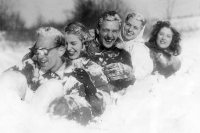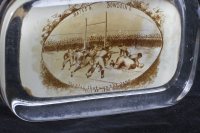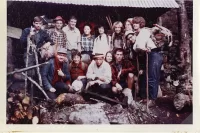
Housed in the basement of Portland’s Equality Community Center, Maine’s newest gear library might lack the store-front appeal of other outdoor outlets in a state famous for its outdoor recreation.
But at the Kindling Collective open house on June 10, the party lights, sound of laughter, and impromptu outdoor-gear lessons spoke of a warm, welcoming community and, most of all: joy.
Launched by Hallie Herz ‘11 and Eva Fury, Kindling is an outdoor gear library focused on helping the queer community access the outdoors in a safe, fulfilling, and affordable way. While it joins a growing network of outdoor gear libraries serving historically marginalized communities across the country, it is the first that caters specifically to queer people, according to the Outdoors Empowered Network in San Francisco.
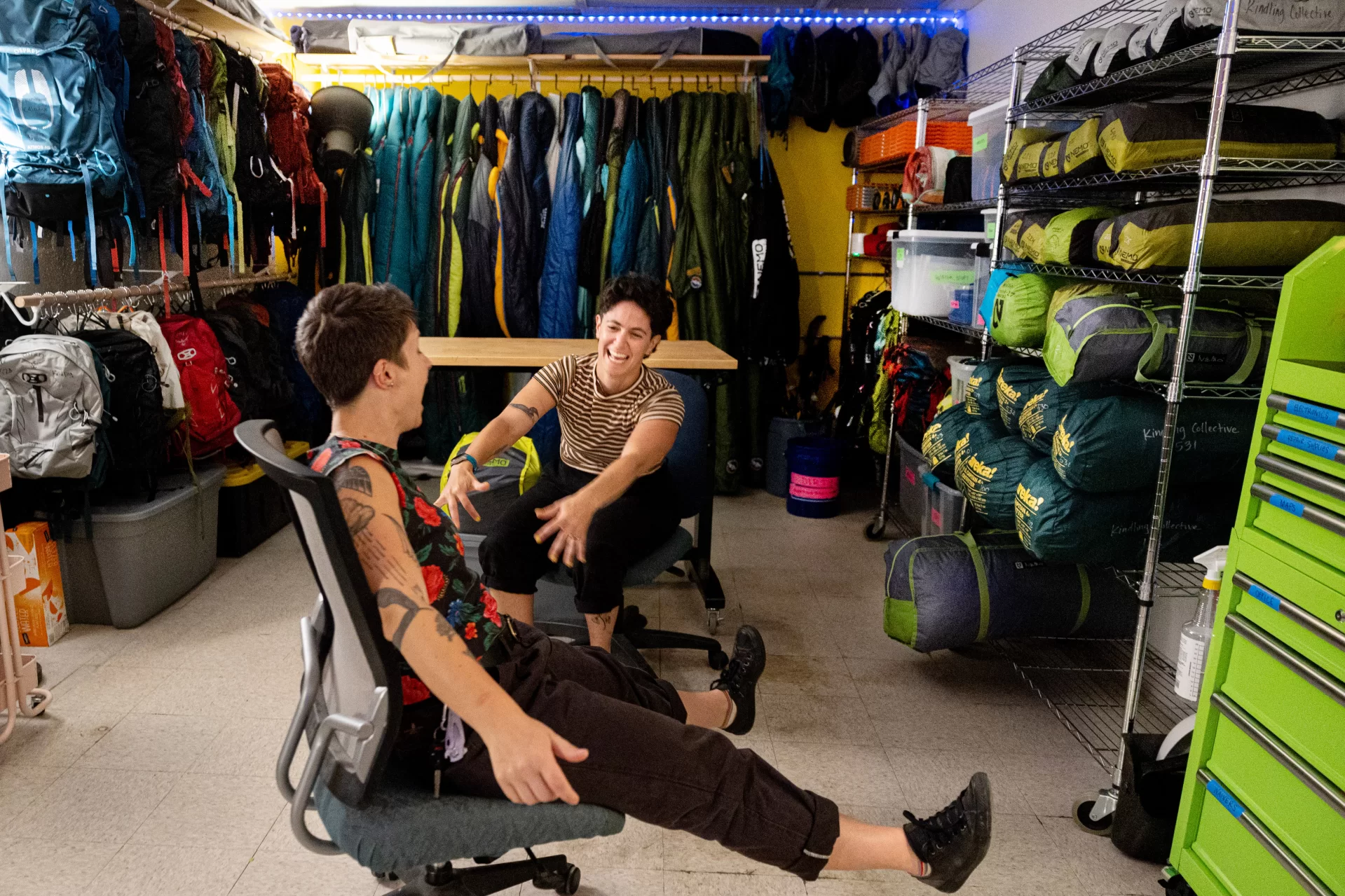
Even a simple weekend camping trip to a state park can require a level of expertise and expensive gear that many lack. Add to those barriers the stress of facing unfriendly, or even hostile strangers, and outdoor fun for a queer person can be a nonstarter. Yet the kind of joy found in the woods, Herz said, is essential for queer people today.
“We feel it’s important to focus on joy and focus on queer joy especially right now with all of the hateful anti-trans laws and rhetoric. It is a time when queer people need a space where they can be themselves and find connections to things that sustain them,” Herz said. “We really think about it as a resilience practice, a refilling and recharging. We see this work as liberation work.”
“Traditional outdoor recreation culture caters very much to white, straight, male people. If you’re not that person, it can feel disorienting, like you don’t belong…”
Seraph White
Kindling Collective joins over 25 outdoor gear libraries across the country that work with communities that encounter significant barriers to accessing the outdoors, according to Seraph White, executive director of the Outdoors Empowered Network. Such gear libraries are run by community activists and outdoor educators that see the importance of getting people, especially young people, outside.
“Traditional outdoor recreation culture caters very much to white, straight, male people. If you’re not that person, it can feel disorienting, like you don’t belong even though the outdoors should be where everyone belongs,” White said. “There are a lot of challenges beyond the gear. If you don’t know how to address the challenges in an outdoor space with racism, sexism, and homophobia, the outdoors can feel inaccessible.”
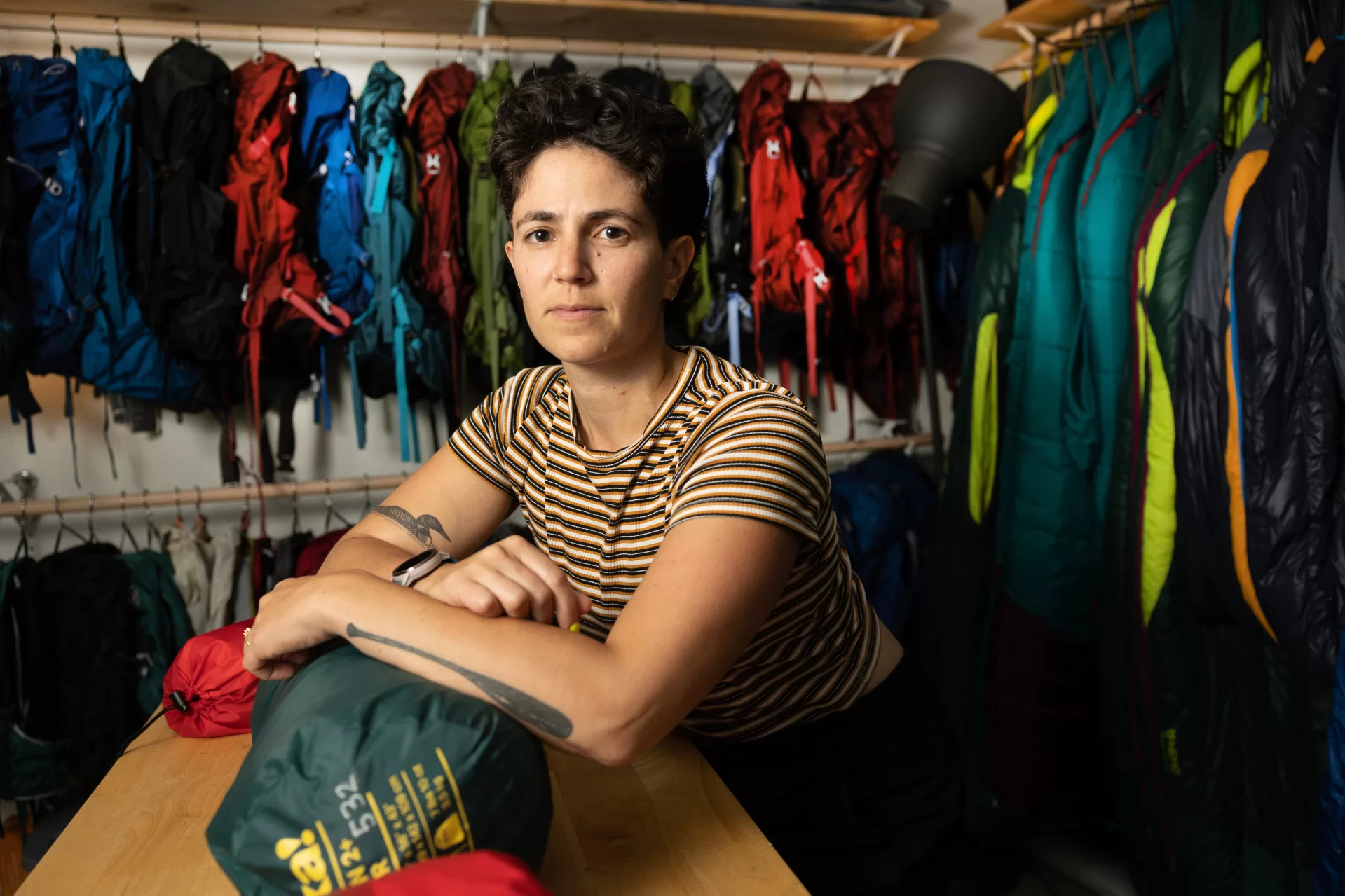
The good news, said Cat Runner, founder of Queer Climbers Network in Kentucky, is that queer-focused outdoor groups are growing and more climbing gyms are holding events that cater to the LGBTQ+ community. His online directory that offers a calendar of events includes about 50 queer-climbing groups from Seattle to South Carolina.
“I think the societal want for these programs increased at the beginning of the Black Lives Matter movement,” Runner said. “There was a kind of collective push that came with gyms being way more receptive. To some extent, it’s performative. But I think some gyms really are pushing to try to make sure this space is a space [the LGBTQ+] community wants to come into.”
At Kindling in Portland, anyone can join the gear library, which allows members to borrow outdoor gear (similar to how a book library loans out books), but the focus also is on empowering the queer community, since so much of the outdoor recreation industry does not, said Herz and Fury, who are spouses as well as business partners.
Breaking down societal barriers forged by colonialism and privilege is central to their mission. They’re quick to point out the land in Maine where they’ll lead outings and recommend camping trips is the native land of the Wabanaki people.
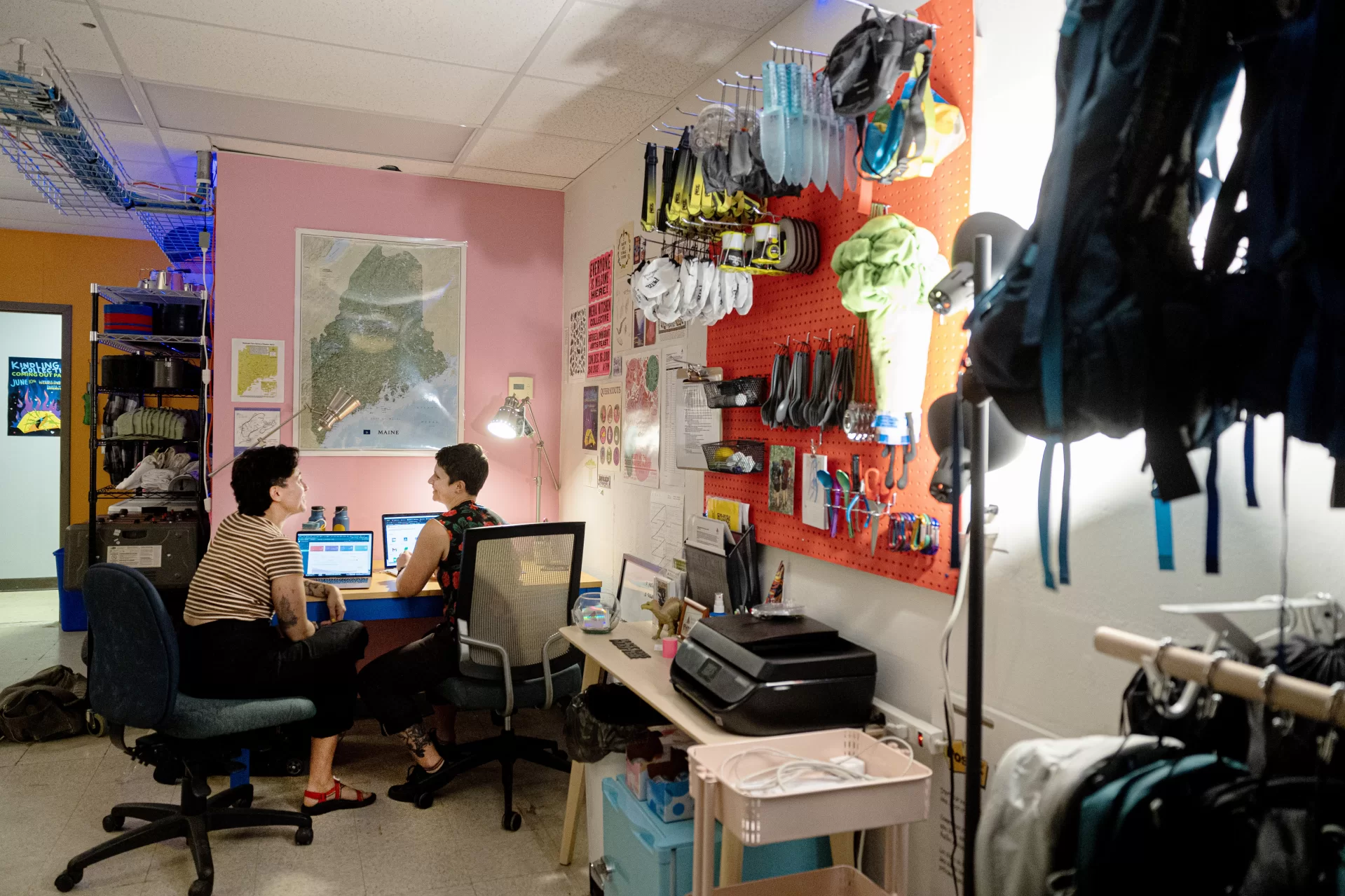
Fury said the global concern about climate change is another big reason why getting more people outdoors is so important right now.
“We all kind of have an anxious attachment to the planet because we’re worried she’s going to die,” Fury said. “We’re experiencing wildfires on the East Coast in a way the West Coast has experienced for years. And did everyone else hear about all the dead fish that washed up on the coast of Texas? It feels apocalyptic right now. So we need the joy (found in nature) to be able to keep surviving through this.”
Fury brings a decade of experience as a project manager and community organizer for public health programs and nonprofits focused on racial and gender justice. They worked with LGBTQ youth and young people experiencing homelessness, providing gender-affirming training to those who serve them. They also bring the unbridled energy of a competitive ultimate Frisbee player and coach — one who coached Cold Front, the Bates’ women’s-matching ultimate Frisbee team, for the 2022 spring season.
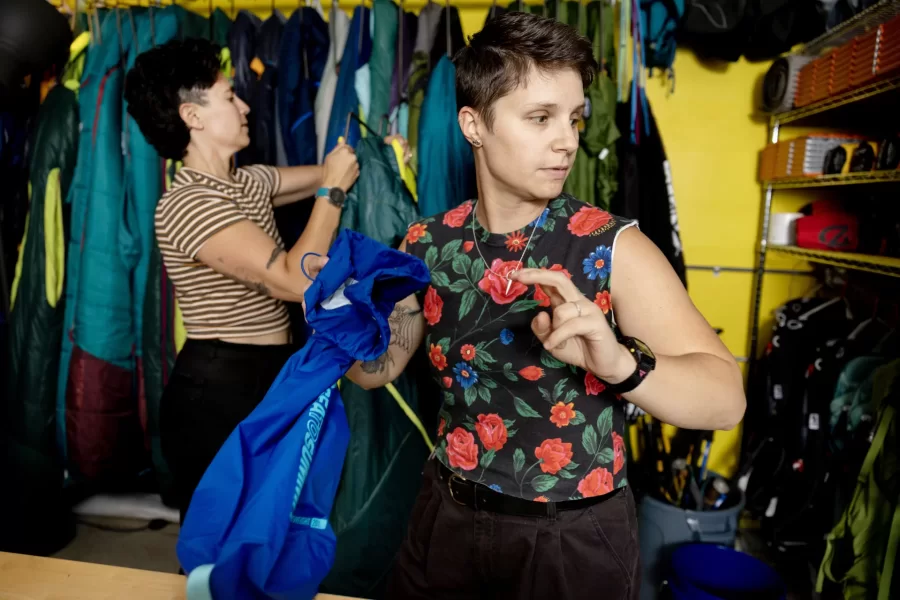
Herz is the outdoor-gear expert, wilderness guide and outdoor educator, having worked for 10 years as a teacher and for 15 years as a backcountry wilderness guide throughout Canada, from Quebec in the east to the Yukon in the far northwest. They have led canoe and backpacking trips for queer and trans people for the Venture Out Project.
Growing up in the small coastal Maine town of Damariscotta Mills, Herz lived an outdoor lifestyle where they paddled, swam and hiked — before finding a second home at a wilderness camp in Ontario at age 9.
After transferring to Bates from Barnard College their sophomore year in 2008, Herz joined the Bates Outing Club, leading trips, serving as secretary, and receiving the club’s Sawyer award for their contributions. The experience was positive, but not as inclusive as they would have liked, Herz realized years later.
“The culture of the BOC was typical of most outdoor spaces I’d found myself in up to that time in my life: male-dominated, bro-y, white, and upper-middle class or wealthy,” said Herz. Within that culture, Herz didn’t feel they could share their queer identity, so they hid it. “I unconsciously adapted myself to fit into that culture and looking back, I’ve realized how that contributed to an exclusive and elitist environment and meant hiding my queerness and showing up as only part of myself.”
Over the last two years, the Bates Outing Club revised its mission statement — and its programming — to focus more on diversity, equity and inclusion, noting that the club’s members “recognize that outdoor recreation has historically and continues to exclude people of marginalized identities.”
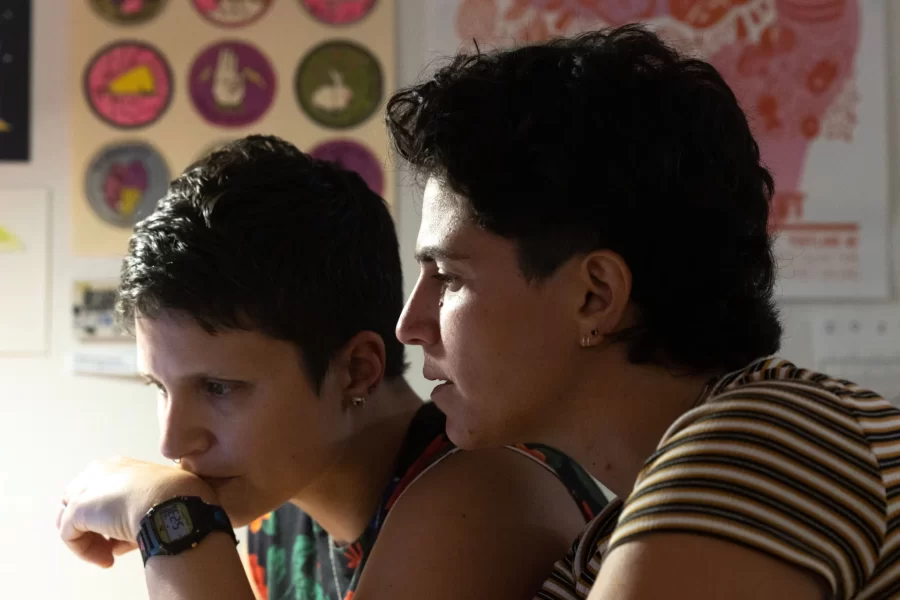
In Portland, Herz is now working to create an outdoor club that celebrates inclusion and champions queer people exploring the outdoors.
“I saw the harm caused by having that exclusive space. So I wouldn’t say the Outing Club is my origin story, but I think that experience influenced the way I want to approach this work,” they said.
Kindling Collective’s home in the Equality Community Center is part of Portland’s arts district. Rainbow banners and a large Black Lives Matter flag welcome visitors in the large lobby. In the basement construction is underway on a large seminar room where Fury and Herz will hold demos and classes.
“This is a big step for the queer community in Portland, to make the outdoors an inclusive space.”
Danielle Arroyo
Already the co-founders have collaborated with outdoor organizations that also serve groups facing barriers to outdoor recreation, such as the Confluence Collective, which teaches fly fishing; Maine Gear Share in Brunswick; and Inclusive Ski Touring at Mt. Abram.
Danielle Arroyo, a friend of Herz and Fury, looked around at the crowd that came to Kindling’s open house on June 10, nodded and smiled.
“This is a big step for the queer community in Portland, to make the outdoors an inclusive space because going backpacking, you don’t know who you’ll encounter,” said Arroyo. “Being a mixed-race queer person, safety is a concern. I want to put my money and energy toward people who will include me.”
Aided by Mission Earth, a nonprofit that serves as a fiscal sponsor, Kindling secured a $90,000 grant from the Sewall Foundation and one for $10,000 from the Quimby Family Foundation. With the help of donations garnered through the Outdoors Empowered Network they’ve filled their gear locker with everything from backpacks, day packs, tents and sleeping bags to camp stoves, headlamps and camp chairs.
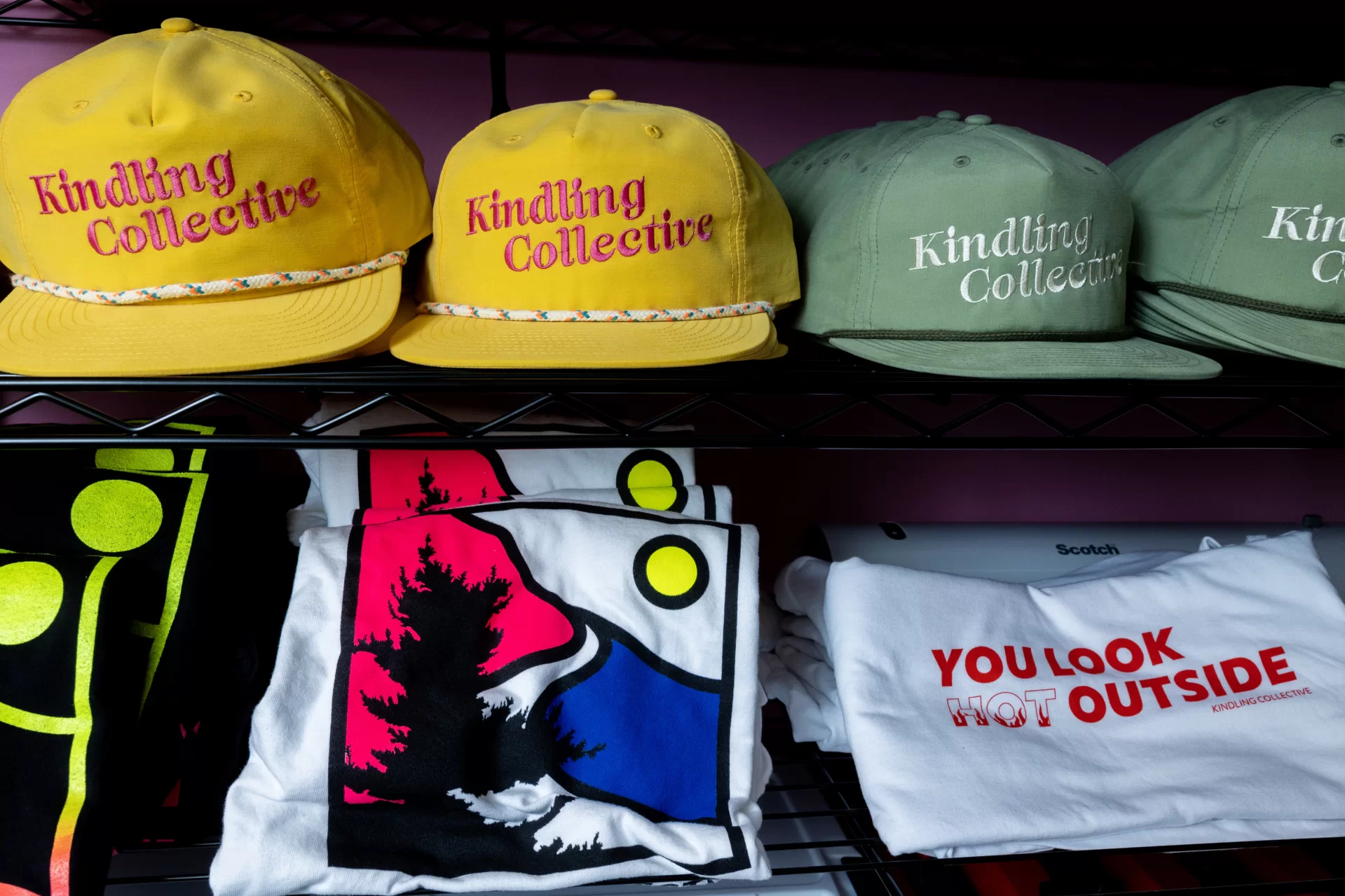
Kindling’s tiered payment method allows monthly or yearly memberships costing as little as $5 to $15 for an individual and $45 to $225 for families.
Fionnuir Ni Chochlain, who recently moved to Portland from Philadelphia for a summer internship, was astounded when they learned of the $5 monthly membership fee at the open house.
After stopping by the open house, Julia von Ehr noted Kindling’s social-justice component.
“There’s so much capitalism in the outdoor economy. It’s nice to break away from that,” they said.
Michaela Cowgill reflected on a recent yoga class she attended that was devoted to queer people — and how it allowed for recreating and meditating with others without the fear of being judged. Kindling will offer that, she said.
“Normally, there aren’t a lot of queer people in these spaces,” Cowgill said. “I want to walk into a space where I can be myself and don’t have to worry about that. It’s fortifying.”
